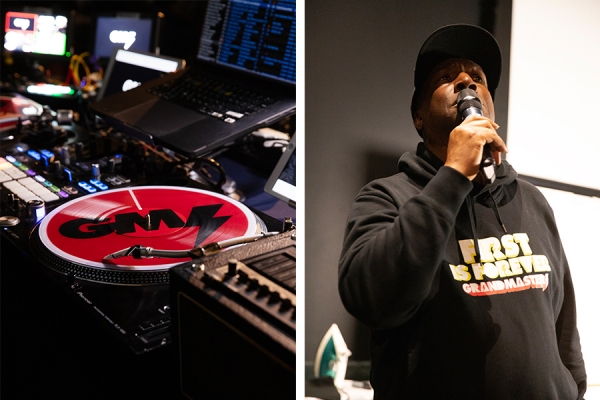
Matthew Muniz
“Four bars forward is equal to six counterclockwise revolutions, which equals a full loop extraction.” That discovery changed the course of music forever and, on February 7, a full house of students in Roone Arledge Cinema heard directly from Grandmaster Flash about how he started the hip-hop revolution with a mathematical equation.
Flash was on campus as part of a special session of Dean Josef Sorett’s “Hip Hop at 50: Music, Politics, Religion” course. A seminal figure in the genre’s origin story, Flash is also the founder of Grandmaster Flash and the Furious Five, the first rap group to be inducted into the Rock & Roll Hall of Fame. He is currently in the midst of his Birth of a Culture Tour.
“Since its earliest formations, hip-hop has celebrated individuals coming together in community to create something new, something that changed the world — and the music and culture wouldn’t have been possible without people like Grandmaster Flash willing to take risks and put themselves out there,” Sorett said.
In addition to the course’s regular students, undergraduates from Columbia College, Columbia Engineering and Columbia General Studies were invited to enter a lottery to attend as part of the newly launched Undergraduate Community Initiative. After entering to a standing ovation, and in a cap and gown, Flash dove into a discussion of the history of hip-hop, starting with his youth in the South Bronx and his love of music and electronics. He recounted sneaking into his father’s music closet as a toddler to pull down forbidden records, obsessed with how the record player magically filled his living room with sound.
Flash attended Samuel Gompers Industrial H.S. in the Bronx, where he learned about electronics and then took that knowledge home. His teenage years were spent tinkering with appliances while working on building something that would change the music world. He recalled visiting junkyards to get radios from cars, accidently blowing through amps, scratching vinyl records and breaking turntables on his way to developing an entirely new musical style. His work led to his groundbreaking equation, which he calls the Quick Mix Theory.
Flash used his Quick Mix Theory to form a repeatable, standardized way of sampling beats; in order to rewind vinyl records, he also invented what is now called a slipmat by using felt and waxed paper to line the underside of the record — then it could be moved counterclockwise while the turntable continued to spin forward.
During the opening Q&A session, Sorett commented on Flash’s influence, saying, “One of the ways people refer to you is as ‘Godfather of Hip-Hop’; they also refer to you as a scientist.”
“I like scientist better,” Flash responded, “because how I came up with this formula is math, science and a touch of physics.” He continued, “I’m a scientist first, I’m a DJ second — pushing the envelope is what I believe in.”
Later, Flash changed into a self-branded sweatshirt and got in front of the turntables. While cameras projected an overhead view onto the cinema’s giant screen, students watched in real time as he demonstrated his theory, spinning records seamlessly and filling the room with harmonious beats.
After his musical demonstration, Flash fielded questions. Excited students asked everything from where he thinks the industry is going to how young people who are interested in recording and producing music can improve their skills. One student asked, “At what point did you know that what you created was bigger than you?”
“I knew for quite some time, [but] it took me a long time to accept it,” Flash answered thoughtfully. “I was afraid of it for a long time. I toured when I was very young, and to go to different countries and see the DJ taking two turntables and a mixer and hear a person speaking in front of them — I was very afraid for a long time. Because this thing that I had been doing for three years, this whole thing could have missed.
“You know, some people put their whole life into something and then serve it to the public and the public go, ‘Nah, we ain’t with that,’” he continued. “It took me many decades to accept what I did. I grew up as a geek, I didn’t know how to rap to girls, I didn’t know how to be cool. I was strictly math, science — grades were A. Corny, geek, nerd — I grew up as one of those. I got more comfortable as nerds got more accepted. Because now nerds rule the world, and I’m a nerd.”